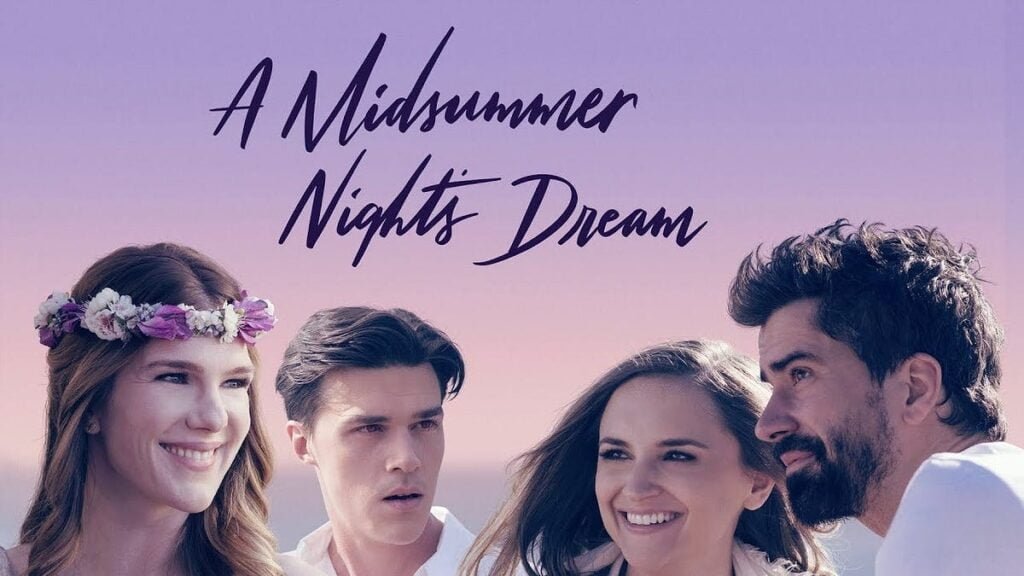
A Midsummer Night’s Dream
William Shakespeare’s “A Midsummer Night’s Dream,” a modern interpretation by Casey Wilder Mott, is made up of about one million creative choices, each one of them dirty. But none of them are so explicit as what happens to poor Nick Bottom. In the Bard’s play, Bottom the comic relief character whose head is eventually turned into that of a donkey becomes an actual ass in this version, as in: a bottom. You get it.
It is precisely such inspired idiocy that gives this movie or any movie based on Shakespeare, whether its setting is also contemporary or strictly classical a sense of full out playfulness that it often lacks. This is not the production that would have been put on in 1596; if you’re looking for an exact replica of what you might have seen at The Theatre, this ain’t it. But Mott’s movie is fun as hell on its own terms.
This story of potions and potent emotions gets set in L.A., but only teases at cynicism toward superficial people who live there. (Don’t worry: Same Shakespearean text.) It remains in Athens, though the Hollywood sign now says “Athens,” among other small details when the film introduces its players like mini movie trailers before they appear.
In this world, Hermia (Rachel Leigh Cook) is a big-time Hollywood star who goes by H-Pup on tabloid covers; her friend, Helena (Lily Rabe), is a Venice Beach hipster who participates in poetry readings while pining after financial bro Demetrius (Finn Wittrock), who doesn’t love her and wants Hermia instead. Meanwhile even though Hermia’s father Egeus (Alan Blumenfeld) wants her to wed Demetrius she digs Lysander much more; he’s played by Hamish Linklater as a stoner type but still lovable.
All of this tension leads everybody out of Athens and into the woods, where king fairy Oberon (Saul Williams) helps oversee the dispensing of a secret love potion, made by the self entertaining Puck (Avan Jogia). In doing so, they frighten a film crew, led by a director named Quince (Charity Wakefield), when peppy actor named Bottom (Fran Kranz) goes through his aforementioned transformation. Shortly thereafter, queen of the fairies Titania (Mia Doi Todd) falls in love with Bottom. Makes for quite a wedding party story, as we see toward the end.
It’s a lot of story but Mott and his team are able to coat it all with some kind of special zeal. They embrace it as an opportunity for composed shots and surprising edits; I could see this being put on mute and being just as funny. For most part, Mott’s film truly pops; it only loses energy when not stuck on dialogue, which is dangerous territory for any script that has characters speak while standing around in woods. But Mott is clearly high off at least the second supply that Baz Luhrmann was using during “Romeo+Juliet,” to which this movie is kin. (Joss Whedon’s own “Much Ado About Nothing,” a small project inspired by his personal Shakespeare book club, fades further away.)
“A Midsummer Night’s Dream” has the flavor of a movie intended to be loved by people of very particular taste; it knows who its fellow geeks are in the audience.
If you are not familiar with the phrase “Out, damned spot,” you might be perplexed by the sudden appearance of Theseus shouting at a dog named Spot to get off his chair. But this is one of many wonderfully strange details that make the film so charming.
Fortunately, it seems that everyone who would love this movie is in it, and their presence only amplifies the giddy infectiousness of the whole enterprise. They say their lines straight but with Caldecott winning hamminess; they revel in the above-and-beyondness of these characters as lively archetypes once more. Even Bottom whose ass-face does nothing to dilute him gets a scene stealing sequence around his Midsummer night’s dream from the woods being like an internet video gone wrong where everything is bad except for how much worse it could have been: a terrible green screen upon which actors are pasted together even worse than Shakespeare doing Tommy Wiseau’s The Room.
Of all Shakespeare movies made within my lifetime, A Midsummer Night’s Dream (2016) reminded me most of that well worn Gene Siskel standard: “Is this film more interesting than a documentary about the same actors having lunch?” This is that luncheon; this is that meeting of minds between colleagues; this is that potluck dinner at an artsy friend’s house. Shakespeare’s prose only gives us crumbs from what weighs down our plates here, folks.
Watch A Midsummer Night’s Dream For Free On Gomovies.
.jpg?w=1024&resize=1024,1024&ssl=1)
.jpg?w=1024&resize=1024,1024&ssl=1)
.jpg?w=1024&resize=1024,1024&ssl=1)
.jpg?w=1024&resize=1024,1024&ssl=1)
.webp?w=1024&resize=1024,1024&ssl=1)
.jpg?w=1024&resize=1024,1024&ssl=1)
.jpg?w=1024&resize=1024,1024&ssl=1)
.jpg?w=1024&resize=1024,1024&ssl=1)